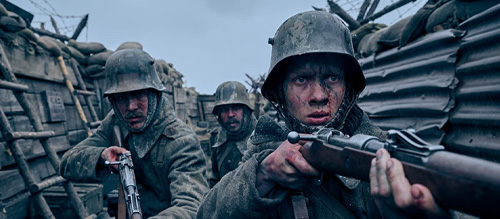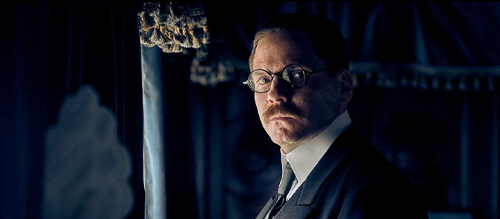All Quiet on the Western Front (2022) Review

All Quiet on the Western Front (2022)
Director: Edward Berger
Screenwriters: Edward Berger, Lesley Paterson, Ian Stokell
Starring: Felix Krammerer, Albrecht Schuch, Daniel Brühl, Moritz Klaus, Adrian Grünewald, Aaron Hilmer, Edin Hasanovic, Devid Streisow, Andreas Döhler, Sebastian Hülk
In 1929, inspired by his wartime experiences, German novelist Erich Maria Remarque published “Im Westen nichts Neues”, most commonly translated into English as “All Quiet on the Western Front”. A year later, Lewis Milestone directed a Hollywood adaptation that became the third film to be named Best Picture at the Academy Awards. Now Edward Berger (‘Deutschland 83’) directs the first German-made feature adaptation of the book for Netflix.
We follow 17-year-old Paul Bäumer (Felix Krammerer) who, along with his school friends, joins the German army in 1917 and is sent to the Western Front in France to live out a hellish existence in the final year of World War One.
The film opens on a stunning tableau of an alpine mountainside highlighted by a salmon pink sky, then you hear a distant rumble: thunder or gunfire? This is soon answered as James Friend’s camera slowly tracks downwards and across a battlefield strewn with corpses, the white of the frost and dust broken up by garish pools of blood, machine gun fire still shrieking past with no target left to mow down.
While the 1930 film began with the naive hope of youth and ended with the utter despair of the end of innocence, Berger’s All Quiet on the Western Front drops you straight into the waterlogged boots of soldiers desperately scrambling to survive in the trenches from the start, a blistering opening battle cut short by the film’s sober black title card.
Few other lines of dialogue this year will be more chilling than Paul’s schoolmaster addressing his wide-eyed and impressionable young audience with the proclamation that “The Kaiser needs soldiers, not children”. But recruit children the German war machine did, by the millions.
It’s often distracting in Hollywood stories involving teenage soldiers who are so obviously played by older actors for the sake of acting experience or star power. While the cast playing Paul and his school friends here are also in their mid-20s, they are utterly convincing as immature, excitable kids with peach fuzz and acne who are about to have what remains of their youth utterly obliterated.
One of the most memorable and hard-hitting chapters of the earlier Oscar-wining version followed the journey of a pair of fine leather boots as they were passed between a number of soldiers who all met terrible ends. An early image we see here is a mountain of footwear unfeelingly but necessarily stripped from the bodies of soldiers who will no longer need them, the rest of their mud and blood-caked uniforms bundled up, taken by train, washed and repaired for the next batch of incoming recruits.
Unassuming moments of natural beauty – a peaceful field powdered with snow here, a fox and her cubs taking shelter in the winter there – provide necessary respite from all the horrors on show. Acts of sheer desperation are presented as the necessities they were, like meat-starved soldiers stealing geese from a farm or frantically gorging themselves on any food found in a French trench moments after liberating it.
Even when shown in the most awful conditions, you don’t usually get to see soldiers on film being vulnerable. They have to be brave, to shut themselves off to an extent, in order to tap into the primal aspect of themselves that allows them to kill, but they still feel. A tender little moment between Paul and surrogate older brother “Kat” Katczinsky (Albrecht Schuch) sees them at their most exposed, sitting side by side on the makeshift toilet as Paul tenderly reads aloud a letter from Kat’s wife to his illiterate friend.

Telling the story from a German perspective allows for scenes of peace negotiator Matthias Erzberger (Daniel Brühl in a modest but key supporting role) travelling from German High Command to treat with the Allies in the final week before the armistice in November 1918. This storyline also provides an added ticking clock for the soldiers we have been following who have miraculously survived to the dying days of the war; will Germany agree to sign the armistice with such crippling conditions for their country in time to save the lives of the protagonists?
The German perspective of Word War One doesn’t get the spotlight very often, and the conclusion they arrive at here is that the generals exploited their rank and file troops, sending hundreds of thousands to slaughter unnecessarily, for a glory that could no longer be attained. This is demonstrated chiefly by the German generals enjoying good food, wine and cigars in an occupied chateau as their troops continue to be blown apart on the front line. We saw pretty much exactly the same thing with a more comedic tone in ‘Blackadder Goes Fourth’, and the point still holds some truth regarding power structures and inequality, but the information could definitely be delivered in a more nuanced manner.
An extended action scene in the second act with a squadron of tanks and flamethrowers appearing out of the mists to messily pick apart the already beleaguered German defenders also seems a little excessive, too polished and choreographed in comparison to the naturalistic, unglamorous warfare of the rest of the film, though such nightmarish encounters doubtless did happen in the final days of the war as the balance of power shifted.
Scenes like that are few and far between and even this film’s most Hollywood of action scenes is immediately followed up by one that brings you crashing to Earth with Paul (Krammerer here is heartbreakingly raw) repeatedly stabbing a French soldier and being forced to listen to to him die agonisingly slowly beside him in the dirt.
One of the reasons the 1930 film is still so powerfully effective today is that you don’t expect a black and white film made nine decades ago to be so uncompromising and brutal, it shocks you. The latest adaptation of All Quiet on the Western Front follows a long line of gritty, visceral and unsanitised war films from the last 25 years from Saving Private Ryan onwards, including the very fresh in the memory 1917 which shares its setting. Edward Berger’s All Quiet on the Western Front still hits like a Howitzer, telling the German side of the War to End All Wars with respect and the hope that so many will never again be taken by such a futile and stupid conflict.
Score: 19/24

